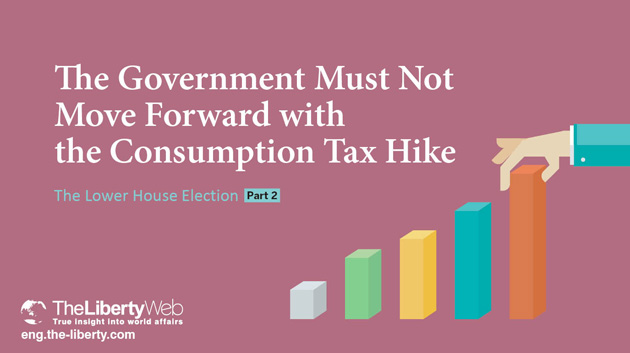The Government Must Not Move Forward with the Consumption Tax Hike
The Lower House Election (Part 2)
Why Is a Rise in Consumption Tax a Bad Idea?
“Raising the consumption tax will result in an increase in corporate bankruptcies and suicide rates.
In April of 1989, Japan introduced a 3% consumption tax for the first time, which resulted in an increase in the number of unprofitable businesses. In 1991, the number of annual corporate bankruptcies that remained in the thousands until that point rose to over 10,000 filings.
In April of 1997, the government again raised the consumption tax from 3% to 5%. Once again, the number of unprofitable ventures increased, and the number of annual bankruptcies, which had been in decline, exceeded 17,000 reports. The number of suicides also rose, and those numbers breached the 30,000 mark in 1998.
A Hike in the Consumption Tax Directly Affects Personal Consumption, which Is Responsible for 60% of Japan’s GDP.
Gross Domestic Product (GDP) reflects the total yearly economic output of a nation. 60% of Japan’s GDP consists of personal consumption with an additional 30% coming in from both public and private sector acquisitions and investments into things such as buildings and machinery that are used to supply private sector demands. In other words, personal consumption claims about 90% of Japan’s economy in some form. Consumption tax has a damaging effect on personal demands for consumption because it depresses the economy.
Boosts in Consumption Tax Put Small and Mid-Sized Businesses at Risk.
What specifically happens in the real world when politicians increase the consumption tax?
First, private retailers need to raise their prices in order to pass off the increased costs from the higher taxes back onto the consumers, which depresses consumer demand.
Large corporations want to purchase supplies at low prices from their subcontractors, and since those subcontractors might go out of business if they don’t sell their goods to large corporations at low prices, small to mid-sized subcontractors won’t be able to transfer the extra costs of the tax burden back onto their goods for sale. They’ll need to pay the extra fees because they can’t pass them onto their business partners in order not to lose the business opportunities to cheaper suppliers.
What will be the result? If one were to look at the auto industry, Toyota could still possibly turn a profit, but their small to mid-sized subcontractors might become unprofitable. All small to mid-sized businesses, which don’t have the potential to transfer extra costs from a consumption tax hike into their supply chains, will become unprofitable or go out of business.
In fact, 46% of the taxes, which weren’t paid to the nation in 2008, came from small to mid-sized businesses that were unable to pay the costs from hikes in the consumption tax. While businesses, which were in the red, were not required to pay corporate taxes, consumption taxes had to be paid regardless of the profitability of the business. In other words, when the consumption tax rises, it preferentially tends to harm businesses that were already in dire straits prior to the changes.
It’s no mystery why increasing the consumption tax has historically resulted in the rise of unprofitable and bankrupt businesses.
The Happiness Realization Party has been organizing demonstrations and petitions to put a stop to the movement to boost this miserable tax to 8% and 10%. In fact, the Happiness Realization Party has been advocating for a reduction in the consumption tax, back to 5 percent, in order to reduce the burden on individuals and businesses, which should provide the necessary incentive to raise the private sector demands again. A lessening of the tax will also lead to economic growth.



















